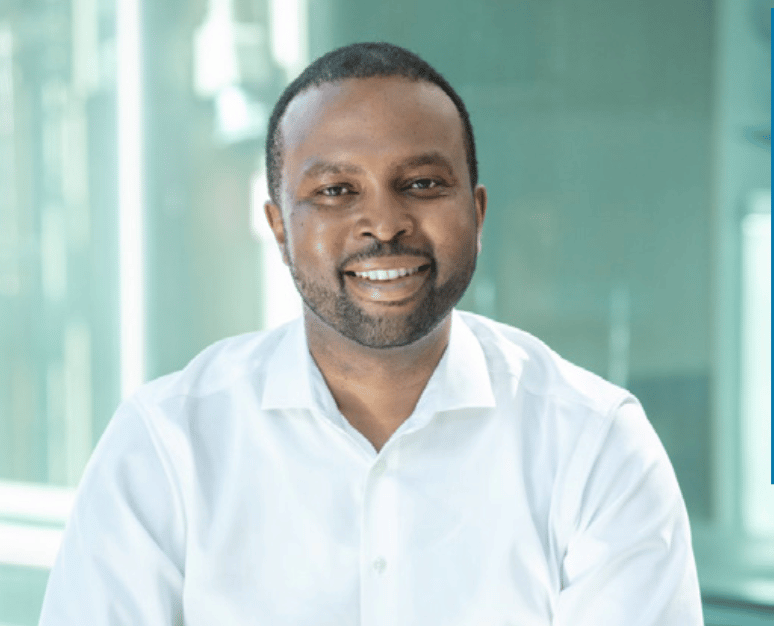Precision healthcare is growing exponentially due to the application of AI in oncolo- gy. MedTech entrepreneur Dr Kingsley Ndoh is leading in this regard from Rwanda, helping oncologists and their patients in sub-Saharan Africa.
By Tiana Cline
Dr Kingsley Ndoh lost his aunt over a decade ago to colorectal cancer. She was only 51 years old and prior to her diagnosis, she was having high-risk abdominal symptoms. But in Nigeria, where Ndoh was both born and studied medicine, the screening guidelines for colorectal cancer begin at the age of 50.
“She didn’t even get the chance to have a screening,” he says. “What I realized is that a lot of the guidelines and treatments don’t work for all populations. It has to be specific to genetics, to the epidemiology and to the clinical context of those regions.” This was one of the reasons Ndoh decided that he wanted to get more training in oncology and that meant moving to the United States (US) to study global health. “I wanted to work at a population level,” explains Ndoh, who ended up at the University of Washington which was followed by a short-term fellowship at the Fred Hutchinson Cancer Center – “my foray into the world of global oncology,” he says.
But it was sitting on a plane, flying back home to Nigeria that sparked Ndoh’s interest in technology – and more specifically, artificial intelligence (AI).
Loading...
“I read a book by Jerry Kaplan called Humans Need Not Apply and became fascinated by the possibilities of AI that were mentioned in healthcare. But when I started digging into it, I realized that a lot of the AI products that are being rolled out and tested in the different aspects of healthcare deal mainly with Caucasian data and not in the context of places like sub-Saharan Africa.”
Precision healthcare is a field that is growing exponentially due to the application of AI in oncology. But AI and machine learning models require a massive about of data and Ndoh came to the realization that while the technology is there, it cannot simply be imported into Africa “because our data is different, and because the clinical context is different”, he says. After many years of planning, Ndoh launched a medical
tech startup called Hurone AI focused on democratizing high-quality cancer care. “The specific area that we wanted to tackle as an early-stage startup was side effects,” he says. And then he came across research that took him by surprise: “In the last 20 years, the oncology medications (the cancer medicines) that have been approved by the FDA; less than 3% of the trial participants were black. That means the full range of side effects are not really known.”
Ndoh brings up recent research which shows that some breast cancer medications which are commonly given to African-American women lead to poor outcomes – and worse side-effects. “Tying this all together heightened my sense of urgency that we need to start understanding the data of diverse populations better,” he says. “I saw Africa as a place where things could be leapfrogged and the specific problem we’re looking at is the deficit between the number of oncologists and patients.”
A SPECIALIST SHORTAGE
Currently, there is around one oncologist to 187 patients in the US but in sub-Saharan Africa, the number sits at one to 3,000. African oncologists are overworked and lack critical support services but Ndoh believes that AI can help make things easier. “When patients get a diagnosis, they are bound to have side-effects from chemotherapy and radiotherapy but they don’t have access to an oncologist because they are few and far between. This means patients will begin to look at other sources of information such as Dr Google, herbalists or native doctors (as they’re called in some parts of Africa),” he elaborates, “and this could lead to worsened outcomes, unexpected symptoms or even hospitalization.”
After a couple of research trips to Rwanda, Ndoh heard how patients, nurses and doctors felt separated from each other.
Not only did the patients feel disconnected from follow-up care, the doctors said that they didn’t have a grasp of managing their patients.
“This is why Hurone AI is a two-way system. It’s a web platform for doctors and nurses to enter demographic and clinical data – including any treatment regimens given – and track their patients better. On the other side, there is a USSD text-based app for patients to receive cancer care remotely so that even those without smartphones can still access valuable information,” says Ndoh.
Once a patient has been registered, they will receive questions related to their well-being and the answers are graded into mild, moderate and severe categories. “On the other end, the data is organized so that the doctors and nurses can easily see how a patient is doing and 70% of the complaints can be addressed by text messaging,” he says. “It also means patients can take action in emergency situations.”
As Hurone AI helps those suffering from the side-effects of cancer treatment, Ndoh is building a database of much-needed clinical and demographic information. His hope is that when the company scales, he will not only be able to automate more medical processes but build models that could use AI to predict side-effects prior to treatment. “And it could eventually help doctors to choose more wisely on what drugs they could give with the same efficacy.”
While Hurone AI is currently doing beta trials in Rwanda, Ndoh has plans to expand throughout sub-Saharan Africa as well as into other low-to-middle income countries. The patient app, which is called Gukiza, means healing in Kinyarwanda “and we make it clear that the app cannot heal you, but it brings that positivity patients need after a cancer diagnosis when they feel like their whole world is falling apart”.
Loading...
